八下Unit 5 What were you doing when the rainstorm came?单元知识点复习(共26张PPT)
文档属性
| 名称 | 八下Unit 5 What were you doing when the rainstorm came?单元知识点复习(共26张PPT) | 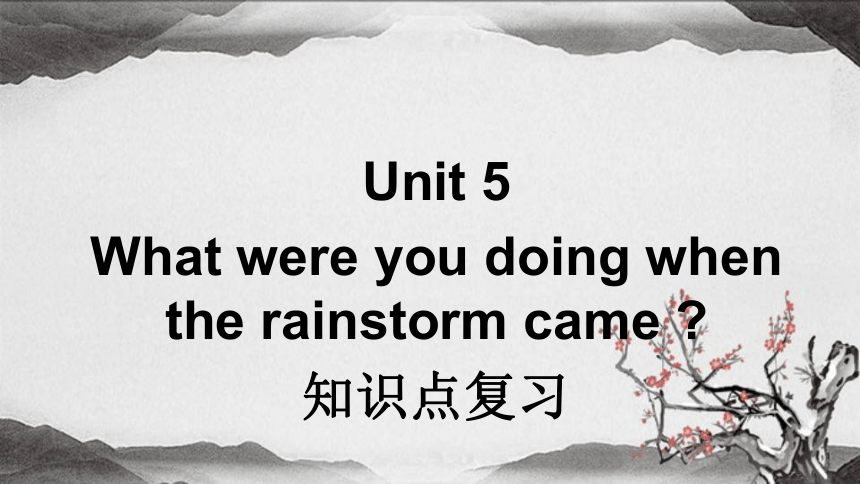 | |
| 格式 | zip | ||
| 文件大小 | 413.1KB | ||
| 资源类型 | 教案 | ||
| 版本资源 | 人教新目标(Go for it)版 | ||
| 科目 | 英语 | ||
| 更新时间 | 2023-04-07 17:15:45 | ||
图片预览

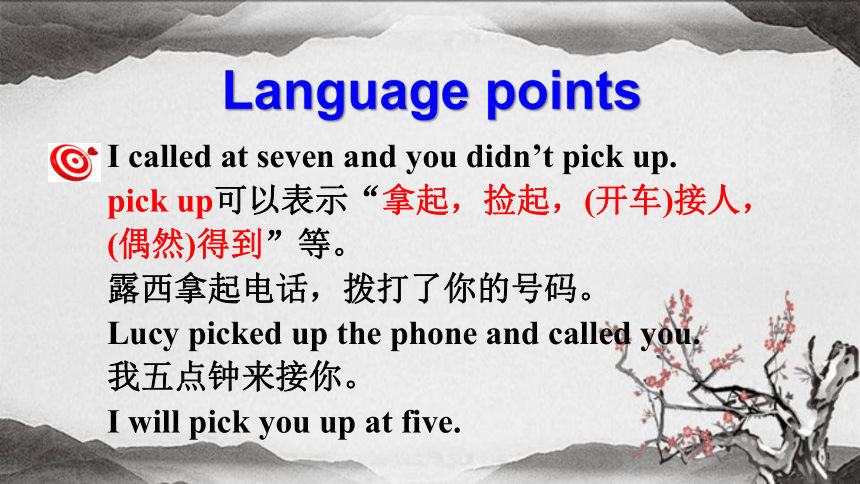
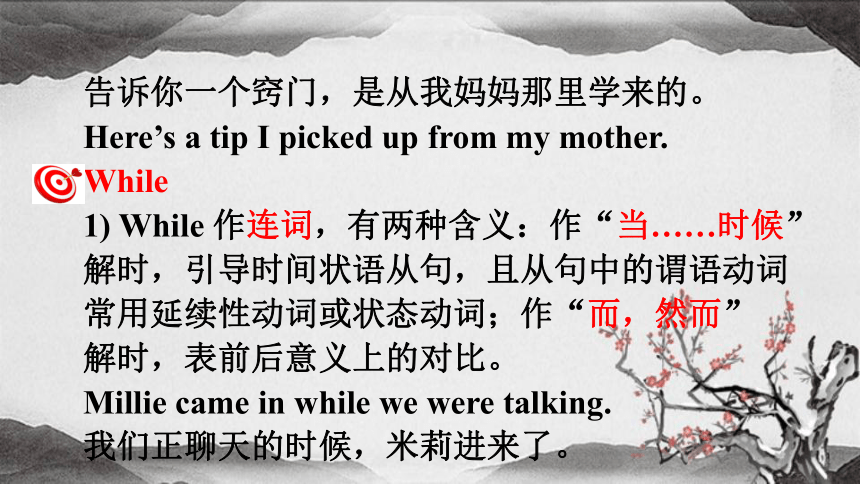
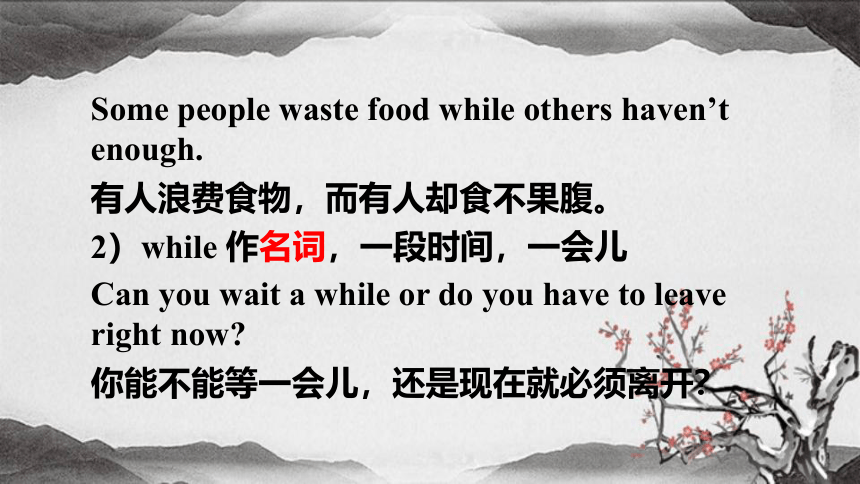
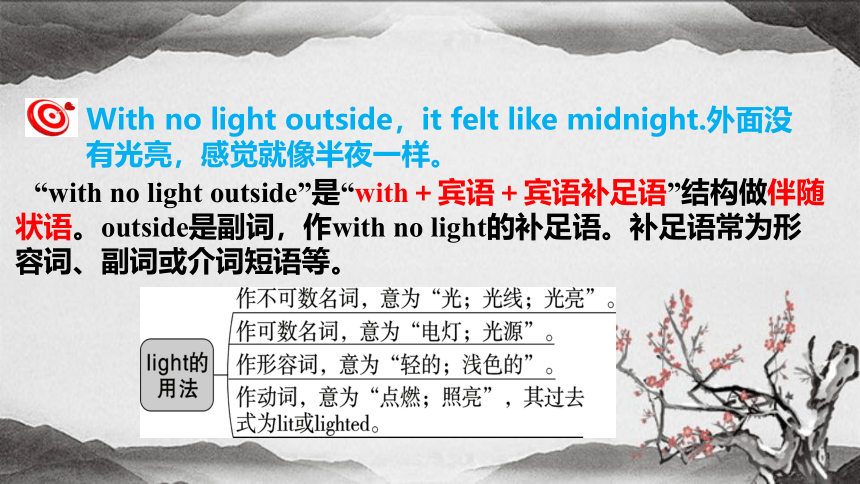
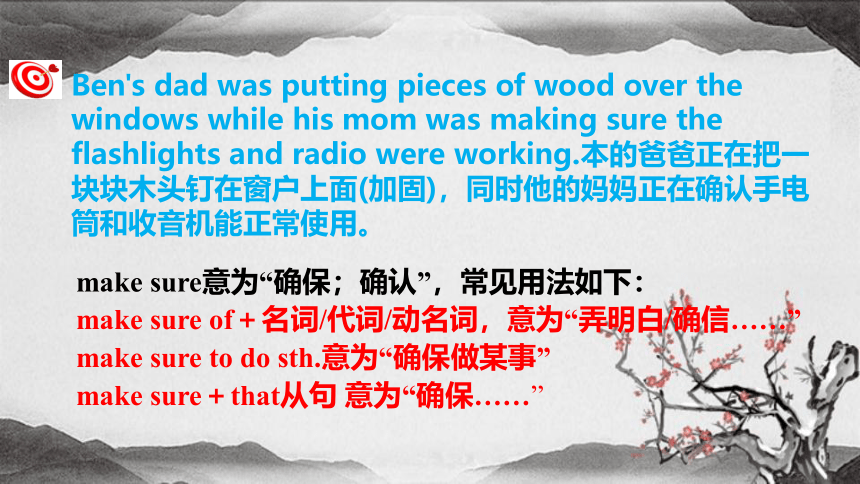
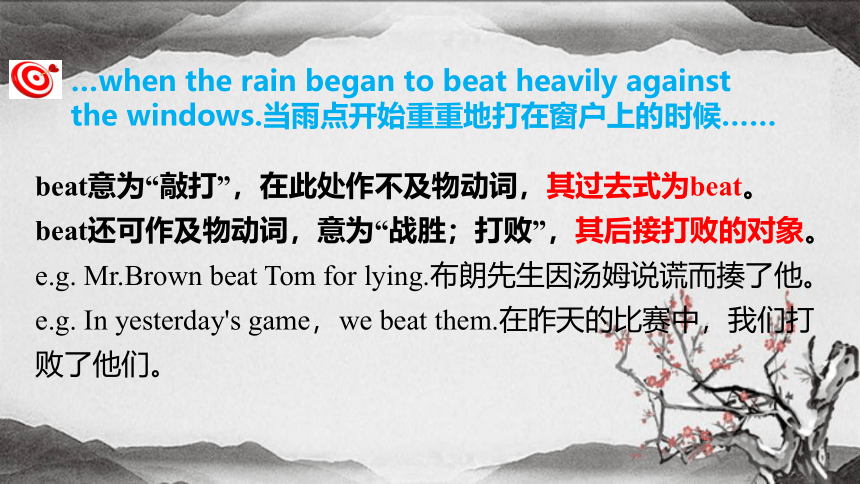
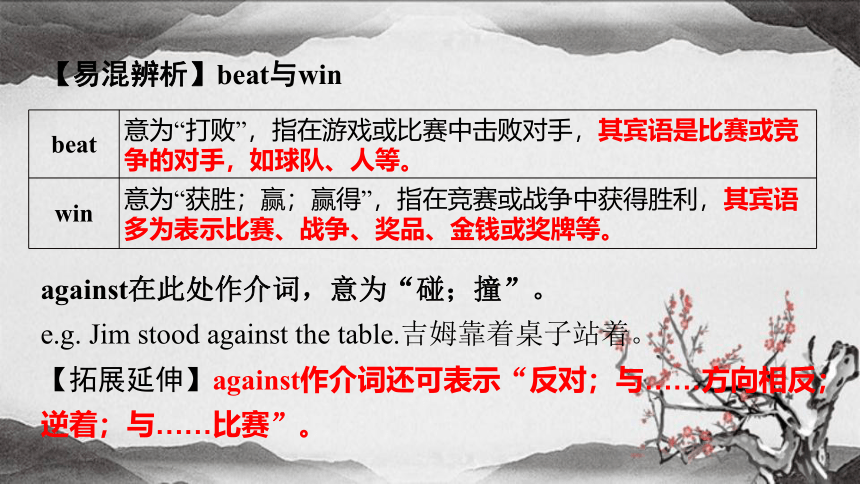
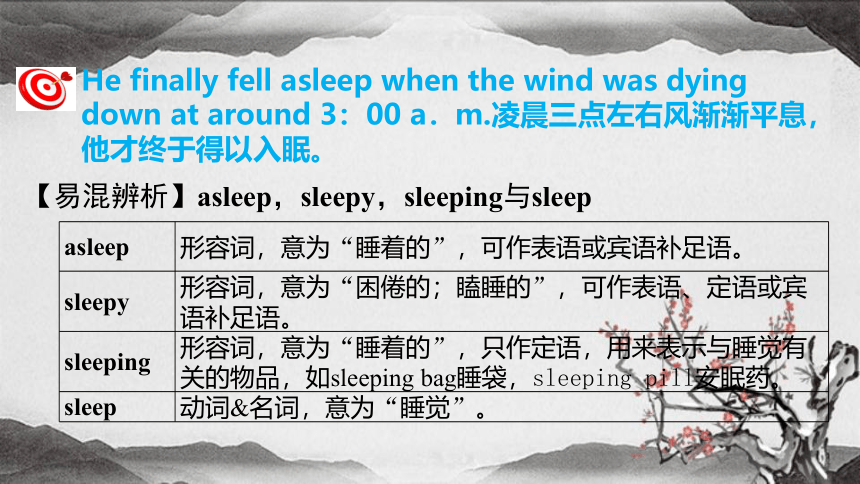
文档简介
(共26张PPT)
Unit 5
What were you doing when the rainstorm came
知识点复习
I called at seven and you didn’t pick up.
pick up可以表示“拿起,捡起,(开车)接人,
(偶然)得到”等。
露西拿起电话,拨打了你的号码。
Lucy picked up the phone and called you.
我五点钟来接你。
I will pick you up at five.
Language points
告诉你一个窍门,是从我妈妈那里学来的。
Here’s a tip I picked up from my mother.
While
1) While 作连词,有两种含义:作“当……时候”
解时,引导时间状语从句,且从句中的谓语动词
常用延续性动词或状态动词;作“而,然而”
解时,表前后意义上的对比。
Millie came in while we were talking.
我们正聊天的时候,米莉进来了。
Some people waste food while others haven’t enough.
有人浪费食物,而有人却食不果腹。
2)while 作名词,一段时间,一会儿
Can you wait a while or do you have to leave right now
你能不能等一会儿,还是现在就必须离开?
With no light outside,it felt like midnight.外面没有光亮,感觉就像半夜一样。
“with no light outside”是“with+宾语+宾语补足语”结构做伴随状语。outside是副词,作with no light的补足语。补足语常为形容词、副词或介词短语等。
Ben's dad was putting pieces of wood over the windows while his mom was making sure the flashlights and radio were working.本的爸爸正在把一块块木头钉在窗户上面(加固),同时他的妈妈正在确认手电筒和收音机能正常使用。
make sure意为“确保;确认”,常见用法如下:
make sure of+名词/代词/动名词,意为“弄明白/确信……”
make sure to do sth.意为“确保做某事”
make sure+that从句 意为“确保……”
…when the rain began to beat heavily against the windows.当雨点开始重重地打在窗户上的时候……
beat意为“敲打”,在此处作不及物动词,其过去式为beat。
beat还可作及物动词,意为“战胜;打败”,其后接打败的对象。
e.g. Mr.Brown beat Tom for lying.布朗先生因汤姆说谎而揍了他。
e.g. In yesterday's game,we beat them.在昨天的比赛中,我们打败了他们。
【易混辨析】beat与win
beat 意为“打败”,指在游戏或比赛中击败对手,其宾语是比赛或竞争的对手,如球队、人等。
win 意为“获胜;赢;赢得”,指在竞赛或战争中获得胜利,其宾语多为表示比赛、战争、奖品、金钱或奖牌等。
against在此处作介词,意为“碰;撞”。
e.g. Jim stood against the table.吉姆靠着桌子站着。
【拓展延伸】against作介词还可表示“反对;与……方向相反;逆着;与……比赛”。
He finally fell asleep when the wind was dying down at around 3:00 a.m.凌晨三点左右风渐渐平息,他才终于得以入眠。
【易混辨析】asleep,sleepy,sleeping与sleep
asleep 形容词,意为“睡着的”,可作表语或宾语补足语。
sleepy 形容词,意为“困倦的;瞌睡的”,可作表语、定语或宾语补足语。
sleeping 形容词,意为“睡着的”,只作定语,用来表示与睡觉有关的物品,如sleeping bag睡袋,sleeping pill安眠药。
sleep 动词&名词,意为“睡觉”。
die down逐渐变弱;逐渐消失
e.g. We hope that the storm can die down before we go sailing.我们希望暴风雨能在我们出航前平息。
【拓展延伸】与die相关的短语:
die of死于(原因多来自内部)
die from死于(原因多来自外部)
die out灭绝;消失
When he woke up,the sun was rising.当他醒来时,太阳正在升起。
【易混辨析】rise与raise
When the school basketball competition started,Kate was still making her way to school.当学校的篮球比赛开始时,凯特还在去学校的路上。
make one's way to意为“前往;费力地前进”。若其后接地点副词,应省略介词to。
e.g. Though it was raining hard,he made his way home.
尽管雨下得很大,他还是回家了。
【拓展延伸】
①make one's way to do sth.意为“费力地做某事”。
e.g.Mike made his way to learn Chinese. 迈克费力地学习汉语。
②way的常用短语:
in the way 妨碍;挡道 on the way 在路上
give way to 让路 in a way 在某种程度上
in this way 以这种方式 lose one's way 迷路
all the way自始至终;一直 by the way顺便问一下
I had trouble thinking clearly after that because I was very afraid.之后由于害怕,我连清晰地思考都有困难。
have trouble doing sth.意为“做某事有困难”。“在(做)……方面有困难”的表达有have problems/trouble/difficulty (in) doing sth.;have problems/trouble/difficulty with sth.
e.g.Do you have trouble learning English?你学英语有困难吗?
【拓展延伸】由trouble构成的其他短语:
get into trouble陷入困境 be/get out of troube摆脱困境
be in trouble处于困境之中
过去进行时
1. 概念: 表示过去某一时刻或某段时间内正进行
的动作。
2. 构成: was/were + 动词现在分词
3. 用法:
a: 表示某一时刻正进行的行为,与特定的过去
时间状语连用,常见的时间有: at 8 last night,
at this time, at that time, at that moment 等
What were you doing at 10 yesterday morning
I was writing a letter to my father at that moment.
b: 表示过去某段时间内正进行的动作。
e.g. We were building a house last winter.
They were waiting for you yesterday.
否定句和疑问句:
e.g. We were not sleeping at home.
Was he feeling well
3.现在分词的构成
一般动词在词尾加-ing,如go—going
2) 以不发音字母e结尾的动词, 先去掉e, 再加-ing
come — coming make — making write — writing
3) 以重读闭音节结尾的动词,如果末尾以一个辅
字母结尾,应先双写这个字母,再加ing,x和w结尾
的除外。
get — getting swim — swimming show — showing
4) 以字母y结尾的单词,直接加ing。如:
carrying playing studying
5) 以字母ie结尾的动词,变ie为y,再加ing。
die → dying lie →lying
6) 以元音字母加e结尾,或以e结尾,且e发音的
动词,直接加- ing。
see — seeing be — being
4. 使用进行时态的注意事项
1)一些动词,如see, hear, love, like, know,
remember, understand, have等表示感情、知觉
和状态的词,一般不用于进行时态。
2) 在there和here引起的句子中,常用一般现在时
代替现在进行时。
e.g. Here comes the bus.
There goes the bell.
5. 过去进行时和一般过去时的区别
1) 过去进行时表示过去正在进行的动作,而一般
过去时则表示一个完整的动作。如:
They were writing letters to their friends last night.
昨晚他们在写信给他们的朋友。 (没有说明信是否写完)
They wrote letters to their friends last night.
他们昨晚写了信给他们的朋友。
(表达了他们已写好的意思,整个写的过程已完成)
2) 当动作延续较长时间时或表示厌烦、赞美等
感彩时, 常用过去进行时表示。如:
He was thinking more of others than of himself.
他考虑别人的比考虑自己的多。
(表示说话者赞扬的口气)
The boy was always making trouble then .
那时,他总是惹麻烦。(表示说话者厌烦的口气)
过去进行时
含义: 表示过去某个时刻
正在进行的动作。
结构:
was/were + doing
例句:
I was having an English
class at this time yesterday.
现在进行时
含义: 表示现在正在进行
的动作。
结构:
is/am/are + doing
例句:
I am having an English class.
1. Fill in the blanks with when or while.
1. ________ I was walking home from school,
I saw a strange light in the sky. But _________
I pointed it out to my friend, it went away.
While
when
2. ________ I told my older brother about the
strange light in the sky, he just laughed and
didn’t believe me.
3. _______ my brother was laughing, the
television news reported that other people
had seen the light as well.
When
While
2. Fill in the blanks with the correct forms
of the words in brackets.
When I ____ (be) in the sixth grade, I_______ (join) a piano competition. I ___________(practice) for four hours every day and my piano teacher ______
(come) three times a week to_______ (help) me. Then the big day finally _________ (arrive). I _____ (be) so nervous when they _______ (call) my name. I _____ (go) up and _________ (start) to
came
joined
practiced
was
help
arrived
was
called
went
started
play. While I ___________ (play), everyone________
(sit) still and listened. I played the song without any mistakes. Then I _________ (wait) for them to call out the winner. When I _________ (hear) my name, my heart______ (beat) so quickly I thought I would stop breathing. I couldn’t believe it. I _________ (win)! It________(be) the happiest day of my life!
was playing
sat
waited
heard
beat
won
was
Unit 5
What were you doing when the rainstorm came
知识点复习
I called at seven and you didn’t pick up.
pick up可以表示“拿起,捡起,(开车)接人,
(偶然)得到”等。
露西拿起电话,拨打了你的号码。
Lucy picked up the phone and called you.
我五点钟来接你。
I will pick you up at five.
Language points
告诉你一个窍门,是从我妈妈那里学来的。
Here’s a tip I picked up from my mother.
While
1) While 作连词,有两种含义:作“当……时候”
解时,引导时间状语从句,且从句中的谓语动词
常用延续性动词或状态动词;作“而,然而”
解时,表前后意义上的对比。
Millie came in while we were talking.
我们正聊天的时候,米莉进来了。
Some people waste food while others haven’t enough.
有人浪费食物,而有人却食不果腹。
2)while 作名词,一段时间,一会儿
Can you wait a while or do you have to leave right now
你能不能等一会儿,还是现在就必须离开?
With no light outside,it felt like midnight.外面没有光亮,感觉就像半夜一样。
“with no light outside”是“with+宾语+宾语补足语”结构做伴随状语。outside是副词,作with no light的补足语。补足语常为形容词、副词或介词短语等。
Ben's dad was putting pieces of wood over the windows while his mom was making sure the flashlights and radio were working.本的爸爸正在把一块块木头钉在窗户上面(加固),同时他的妈妈正在确认手电筒和收音机能正常使用。
make sure意为“确保;确认”,常见用法如下:
make sure of+名词/代词/动名词,意为“弄明白/确信……”
make sure to do sth.意为“确保做某事”
make sure+that从句 意为“确保……”
…when the rain began to beat heavily against the windows.当雨点开始重重地打在窗户上的时候……
beat意为“敲打”,在此处作不及物动词,其过去式为beat。
beat还可作及物动词,意为“战胜;打败”,其后接打败的对象。
e.g. Mr.Brown beat Tom for lying.布朗先生因汤姆说谎而揍了他。
e.g. In yesterday's game,we beat them.在昨天的比赛中,我们打败了他们。
【易混辨析】beat与win
beat 意为“打败”,指在游戏或比赛中击败对手,其宾语是比赛或竞争的对手,如球队、人等。
win 意为“获胜;赢;赢得”,指在竞赛或战争中获得胜利,其宾语多为表示比赛、战争、奖品、金钱或奖牌等。
against在此处作介词,意为“碰;撞”。
e.g. Jim stood against the table.吉姆靠着桌子站着。
【拓展延伸】against作介词还可表示“反对;与……方向相反;逆着;与……比赛”。
He finally fell asleep when the wind was dying down at around 3:00 a.m.凌晨三点左右风渐渐平息,他才终于得以入眠。
【易混辨析】asleep,sleepy,sleeping与sleep
asleep 形容词,意为“睡着的”,可作表语或宾语补足语。
sleepy 形容词,意为“困倦的;瞌睡的”,可作表语、定语或宾语补足语。
sleeping 形容词,意为“睡着的”,只作定语,用来表示与睡觉有关的物品,如sleeping bag睡袋,sleeping pill安眠药。
sleep 动词&名词,意为“睡觉”。
die down逐渐变弱;逐渐消失
e.g. We hope that the storm can die down before we go sailing.我们希望暴风雨能在我们出航前平息。
【拓展延伸】与die相关的短语:
die of死于(原因多来自内部)
die from死于(原因多来自外部)
die out灭绝;消失
When he woke up,the sun was rising.当他醒来时,太阳正在升起。
【易混辨析】rise与raise
When the school basketball competition started,Kate was still making her way to school.当学校的篮球比赛开始时,凯特还在去学校的路上。
make one's way to意为“前往;费力地前进”。若其后接地点副词,应省略介词to。
e.g. Though it was raining hard,he made his way home.
尽管雨下得很大,他还是回家了。
【拓展延伸】
①make one's way to do sth.意为“费力地做某事”。
e.g.Mike made his way to learn Chinese. 迈克费力地学习汉语。
②way的常用短语:
in the way 妨碍;挡道 on the way 在路上
give way to 让路 in a way 在某种程度上
in this way 以这种方式 lose one's way 迷路
all the way自始至终;一直 by the way顺便问一下
I had trouble thinking clearly after that because I was very afraid.之后由于害怕,我连清晰地思考都有困难。
have trouble doing sth.意为“做某事有困难”。“在(做)……方面有困难”的表达有have problems/trouble/difficulty (in) doing sth.;have problems/trouble/difficulty with sth.
e.g.Do you have trouble learning English?你学英语有困难吗?
【拓展延伸】由trouble构成的其他短语:
get into trouble陷入困境 be/get out of troube摆脱困境
be in trouble处于困境之中
过去进行时
1. 概念: 表示过去某一时刻或某段时间内正进行
的动作。
2. 构成: was/were + 动词现在分词
3. 用法:
a: 表示某一时刻正进行的行为,与特定的过去
时间状语连用,常见的时间有: at 8 last night,
at this time, at that time, at that moment 等
What were you doing at 10 yesterday morning
I was writing a letter to my father at that moment.
b: 表示过去某段时间内正进行的动作。
e.g. We were building a house last winter.
They were waiting for you yesterday.
否定句和疑问句:
e.g. We were not sleeping at home.
Was he feeling well
3.现在分词的构成
一般动词在词尾加-ing,如go—going
2) 以不发音字母e结尾的动词, 先去掉e, 再加-ing
come — coming make — making write — writing
3) 以重读闭音节结尾的动词,如果末尾以一个辅
字母结尾,应先双写这个字母,再加ing,x和w结尾
的除外。
get — getting swim — swimming show — showing
4) 以字母y结尾的单词,直接加ing。如:
carrying playing studying
5) 以字母ie结尾的动词,变ie为y,再加ing。
die → dying lie →lying
6) 以元音字母加e结尾,或以e结尾,且e发音的
动词,直接加- ing。
see — seeing be — being
4. 使用进行时态的注意事项
1)一些动词,如see, hear, love, like, know,
remember, understand, have等表示感情、知觉
和状态的词,一般不用于进行时态。
2) 在there和here引起的句子中,常用一般现在时
代替现在进行时。
e.g. Here comes the bus.
There goes the bell.
5. 过去进行时和一般过去时的区别
1) 过去进行时表示过去正在进行的动作,而一般
过去时则表示一个完整的动作。如:
They were writing letters to their friends last night.
昨晚他们在写信给他们的朋友。 (没有说明信是否写完)
They wrote letters to their friends last night.
他们昨晚写了信给他们的朋友。
(表达了他们已写好的意思,整个写的过程已完成)
2) 当动作延续较长时间时或表示厌烦、赞美等
感彩时, 常用过去进行时表示。如:
He was thinking more of others than of himself.
他考虑别人的比考虑自己的多。
(表示说话者赞扬的口气)
The boy was always making trouble then .
那时,他总是惹麻烦。(表示说话者厌烦的口气)
过去进行时
含义: 表示过去某个时刻
正在进行的动作。
结构:
was/were + doing
例句:
I was having an English
class at this time yesterday.
现在进行时
含义: 表示现在正在进行
的动作。
结构:
is/am/are + doing
例句:
I am having an English class.
1. Fill in the blanks with when or while.
1. ________ I was walking home from school,
I saw a strange light in the sky. But _________
I pointed it out to my friend, it went away.
While
when
2. ________ I told my older brother about the
strange light in the sky, he just laughed and
didn’t believe me.
3. _______ my brother was laughing, the
television news reported that other people
had seen the light as well.
When
While
2. Fill in the blanks with the correct forms
of the words in brackets.
When I ____ (be) in the sixth grade, I_______ (join) a piano competition. I ___________(practice) for four hours every day and my piano teacher ______
(come) three times a week to_______ (help) me. Then the big day finally _________ (arrive). I _____ (be) so nervous when they _______ (call) my name. I _____ (go) up and _________ (start) to
came
joined
practiced
was
help
arrived
was
called
went
started
play. While I ___________ (play), everyone________
(sit) still and listened. I played the song without any mistakes. Then I _________ (wait) for them to call out the winner. When I _________ (hear) my name, my heart______ (beat) so quickly I thought I would stop breathing. I couldn’t believe it. I _________ (win)! It________(be) the happiest day of my life!
was playing
sat
waited
heard
beat
won
was
同课章节目录
- Unit 1 What's the matter?
- Section A
- Section B
- Unit 2 I'll help to clean up the city parks.
- Section A
- Section B
- Unit 3 Could you please clean your room?
- Section A
- Section B
- Unit 4 Why don't you talk to your parents?
- Section A
- Section B
- Unit 5 What were you doing when the rainstorm came
- Section A
- Section B
- Review of Units 1-5
- Unit 6 An old man tried to move the mountains.
- Section A
- Section B
- Unit 7 What's the highest mountain in the world?
- Section A
- Section B
- Unit 8 Have you read Treasure Island yet?
- Section A
- Section B
- Unit 9 Have you ever been to a museum?
- Section A
- Section B
- Unit 10 I've had this bike for three years.
- Section A
- Section B
